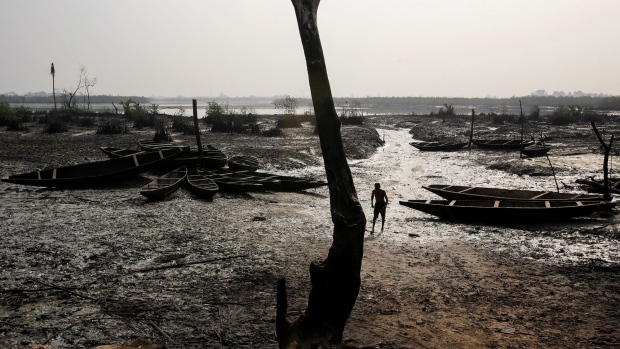Sep 1, 2022
Shell-Backed Cleanup in Niger Delta Is Worse Than Estimated: NGO
, Bloomberg News

(Bloomberg) -- Restoration work at a Shell Plc-financed cleanup of oil pollution in southern Nigeria may be of poorer quality than previously thought, an organization that monitors the effort said after it re-tested samples in an overseas laboratory.
Stakeholder Democracy Network, a non-governmental organization that works with communities in the crude-rich Niger Delta, released its findings in a statement on Aug. 31, after Bloomberg News reported that the project is making one of the earth’s most polluted regions even dirtier, based on non-public documents prepared by the United Nations Environment Programme. The UN body, which is a consultant on the project, has indicated that it’s wrapping up its support at the end of this year.
The NGO urged Shell’s local joint venture and the Nigerian government to ensure the continued involvement of the UNEP in the ongoing cleanup of Ogoniland.
“The loss of UNEP’s technical expertise and resources can only serve to weaken the cleanup,” it said.
Since late 2020, SDN has been independently monitoring activities of contractors hired by a Nigerian government agency called the Hydrocarbon Pollution Remediation Project, or Hyprep. It has previously raised concerns about the quality of the work, finding contamination above permitted levels at more than a quarter of sites that a government regulator had certified as cleaned up by the end of last year.
Now, having sent 20 duplicate samples to an internationally accredited facility in the UK, SDN said “the situation may be worse than we have reported so far,” when it only used labs in Nigeria. Of the 16 specimens with detectable quantities of hydrocarbons, the new analysis found contamination levels that were on average twice as high as results returned locally, it said.
Hyprep didn’t immediately respond to a request for comment about SDN’s statement.
The $1 billion restoration of Ogoniland – a small kingdom in the Niger Delta -- began in 2019, on the advice of a 2011 UNEP report. The project was backed by promised funding from Shell and support from the UN agency.
Decades of oil spills have destroyed the area’s wetlands and farms. A joint venture operated by Shell pumped oil in the region from the late 1950s to 1993 when mass protests by Ogonis accusing the energy giant of polluting their land forced it to cease operations. Oil has continued to leak from wellheads and pipelines.
While Hyprep has already spent tens of millions of dollars in its cleanup efforts, it is yet to contract out the majority of sites that require cleaning.
Non-public UNEP documents seen by Bloomberg indicated that Hyprep’s attempts have been characterized by mismanagement, incompetence, waste and lack of transparency. They highlight the haphazard storage of oil-soaked soil that lets chemicals seep into uncontaminated grounds and creeks, contracts awarded to firms with little environmental-cleanup experience and proposals for millions of dollars in unneeded work.
Hyprep has rejected the UN body’s criticism as “baseless, untrue and unfair.”
SDN, for its part, has reported similar shortcomings at sites supervised by Hyprep, observing the “significant risk of secondary contamination caused by poor practice among some contractors.”
©2022 Bloomberg L.P.


